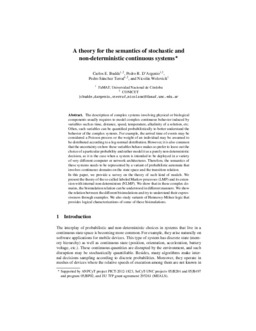| dc.contributor.author | Budde, Carlos Esteban | |
| dc.contributor.author | D'Argenio, Pedro Ruben | |
| dc.contributor.author | Sánchez Terraf, Pedro Octavio | |
| dc.contributor.author | Wolovick, Nicolás | |
| dc.date.accessioned | 2021-07-27T23:02:04Z | |
| dc.date.available | 2021-07-27T23:02:04Z | |
| dc.date.issued | 2014 | |
| dc.identifier.uri | http://hdl.handle.net/11086/19117 | |
| dc.description | Preprint de capítulo del libro Lecture Notes in Computer Science book series (LNCS, volume 8453) | es |
| dc.description.abstract | The description of complex systems involving physical or biological components usually requires to model complex continuous behavior induced by variables such as time, distance, speed, temperature, alkalinity of a solution, etc. Often, such variables can be quantified probabilistically to better understand the behavior of the complex systems. For example, the arrival time of events may be considered a Poisson process or the weight of an individual may be assumed to be distributed according to a log-normal distribution. However, it is also common that the uncertainty on how these variables behave makes us prefer to leave out the choice of a particular probability and rather model it as a purely non-deterministic decision, as it is the case when a system is intended to be deployed in a variety of very different computer or network architectures. Therefore, the semantics of these systems needs to be represented by a variant of probabilistic automata that involves continuous domains on the state space and the transition relation. In this paper, we provide a survey on the theory of such kind of models. We present the theory of the so-called labeled Markov processes (LMP) and its extension with internal non-determinism (NLMP). We show that in these complex domains, the bisimulation relation can be understood in different manners. We show the relation between the different bisimulations and try to understand their expressiveness through examples. We also study variants of Hennessy-Milner logic thatprovides logical characterizations of some of these bisimulations. | es |
| dc.description.sponsorship | Supported by ANPCyT project PICT-2012-1823, SeCyT-UNC projects 05/B284 and 05/B497 and program 05/BP02, and EU 7FP grant agreement 295261 (MEALS). | en |
| dc.description.uri | http://link.springer.com/chapter/10.1007%2F978-3-662-45489-3_3 | |
| dc.format.medium | Impreso; Electrónico y/o Digital | |
| dc.language.iso | eng | es |
| dc.rights | Attribution-NonCommercial-NoDerivative 4.0 International | * |
| dc.rights.uri | http://creativecommons.org/licenses/by-nc-nd/4.0/ | * |
| dc.subject | Nondeterministic Markov decision process | en |
| dc.subject | Bisimulation | en |
| dc.subject | Logic | en |
| dc.subject | Continuous probabilities | en |
| dc.subject | Model Check | en |
| dc.subject | Logical characterization | en |
| dc.subject | Probabilistic automaton | en |
| dc.subject | Transition probability function | en |
| dc.subject | Borel space | en |
| dc.title | A theory for the semantics of stochastic and non-deterministic continuous systems | en |
| dc.type | bookPart | es |
| dc.description.version | acceptedVersion | |
| dc.description.fil | Fil: Budde, Carlos Esteban. Universidad Nacional de Córdoba. Facultad de Matemática, Astronomía y Física; Argentina. | es |
| dc.description.fil | Fil: Budde, Carlos Esteban. Consejo Nacional de Investigaciones Científicas y Técnicas; Argentina. | es |
| dc.description.fil | Fil: D'Argenio, Pedro Rubén. Universidad Nacional de Córdoba. Facultad de Matemática, Astronomía y Física; Argentina. | es |
| dc.description.fil | Fil: D'Argenio, Pedro Rubén. Consejo Nacional de Investigaciones Científicas y Técnicas; Argentina. | es |
| dc.description.fil | Fil: Sánchez Terraf, Pedro Octavio. Universidad Nacional de Córdoba. Facultad de Matemática, Astronomía y Física; Argentina. | es |
| dc.description.fil | Fil: Sánchez Terraf, Pedro Octavio. Consejo Nacional de Investigaciones Científicas y Técnicas; Argentina. | es |
| dc.description.fil | Fil: Wolovick, Nicolás. Universidad Nacional de Córdoba. Facultad de Matemática, Astronomía y Física; Argentina. | es |
| dc.journal.referato | Con referato | |
| dc.description.field | Estadística y Probabilidad | |
| dc.book.country | Alemania | |
| dc.book.editorial | Springer | |
| dc.book.firstpage | 67 | |
| dc.book.lastpage | 86 | |
| dc.book.pages | 280 | |
| dc.book.volume | 8453 | |
| dc.book.title | Stochastic Model Checking. Rigorous Dependability Analysis Using Model Checking Techniques for Stochastic Systems | en |





